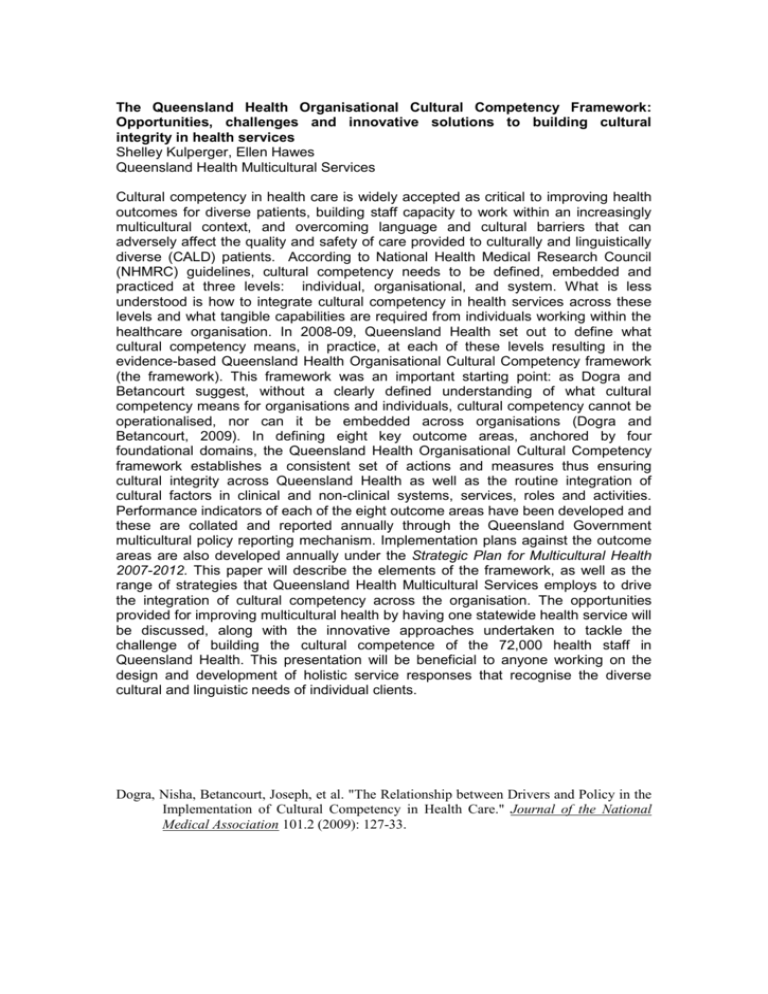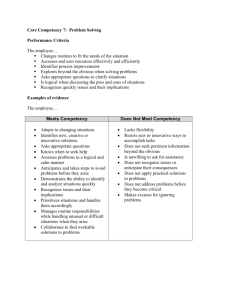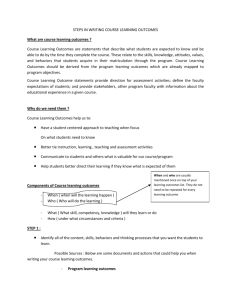Queensland Health Organisational Cultural Competency Framework
advertisement

The Queensland Health Organisational Cultural Competency Framework: Opportunities, challenges and innovative solutions to building cultural integrity in health services Shelley Kulperger, Ellen Hawes Queensland Health Multicultural Services Cultural competency in health care is widely accepted as critical to improving health outcomes for diverse patients, building staff capacity to work within an increasingly multicultural context, and overcoming language and cultural barriers that can adversely affect the quality and safety of care provided to culturally and linguistically diverse (CALD) patients. According to National Health Medical Research Council (NHMRC) guidelines, cultural competency needs to be defined, embedded and practiced at three levels: individual, organisational, and system. What is less understood is how to integrate cultural competency in health services across these levels and what tangible capabilities are required from individuals working within the healthcare organisation. In 2008-09, Queensland Health set out to define what cultural competency means, in practice, at each of these levels resulting in the evidence-based Queensland Health Organisational Cultural Competency framework (the framework). This framework was an important starting point: as Dogra and Betancourt suggest, without a clearly defined understanding of what cultural competency means for organisations and individuals, cultural competency cannot be operationalised, nor can it be embedded across organisations (Dogra and Betancourt, 2009). In defining eight key outcome areas, anchored by four foundational domains, the Queensland Health Organisational Cultural Competency framework establishes a consistent set of actions and measures thus ensuring cultural integrity across Queensland Health as well as the routine integration of cultural factors in clinical and non-clinical systems, services, roles and activities. Performance indicators of each of the eight outcome areas have been developed and these are collated and reported annually through the Queensland Government multicultural policy reporting mechanism. Implementation plans against the outcome areas are also developed annually under the Strategic Plan for Multicultural Health 2007-2012. This paper will describe the elements of the framework, as well as the range of strategies that Queensland Health Multicultural Services employs to drive the integration of cultural competency across the organisation. The opportunities provided for improving multicultural health by having one statewide health service will be discussed, along with the innovative approaches undertaken to tackle the challenge of building the cultural competence of the 72,000 health staff in Queensland Health. This presentation will be beneficial to anyone working on the design and development of holistic service responses that recognise the diverse cultural and linguistic needs of individual clients. Dogra, Nisha, Betancourt, Joseph, et al. "The Relationship between Drivers and Policy in the Implementation of Cultural Competency in Health Care." Journal of the National Medical Association 101.2 (2009): 127-33.






